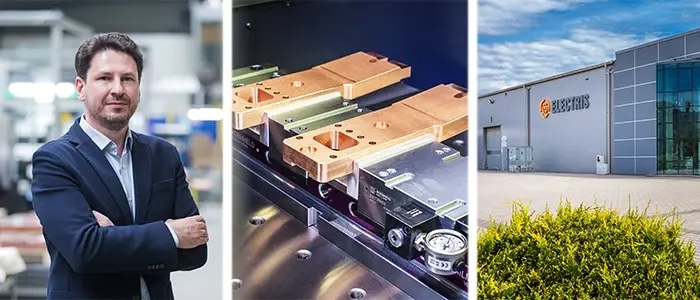
Electris: Copper and aluminium serving the future of industry
Polish company Electris has grown from a small family business into one of the leading European manufacturers in copper and aluminum processing. The company’s development has been driven by investments in technology and a gradual expansion of its markets. Although Electris does not produce electronics in the strict sense, its role in the supply chain of modern technologies is invaluable. Copper and aluminium — two strategic metals — are critical for the efficiency of power systems and, consequently, for the reliability of industrial, energy, and transport equipment.
In a conversation with Evertiq, Łukasz Hajdyła, co-owner and CEO of Electris, discussed the company’s journey from working out of home-based facilities to becoming a strategic supplier for clients across Europe.
"Looking back, I remember the early days of our company with great fondness," says Łukasz Hajdyła in the interview with Evertiq. "Our first projects were carried out by a very small, family-like team. Our technological base was limited to a few second-hand machines, which we gradually modernized and adapted to increasingly demanding orders. That personal commitment and individual approach encouraged our first clients to return with more orders."
Today, Electris employs over 200 people and works with more than a hundred clients across Europe and beyond. Specialized components manufactured at the Białka (Southern Poland) plant are supplied to energy infrastructure producers, data center solution providers, companies in the renewable energy and e-mobility sectors, railway equipment manufacturers, battery industry clients, heavy industry, and many others.
"More and more sectors are recognizing the potential of copper and aluminum as key raw materials in the electrification and digitalization processes," says the CEO of Electris.
Łukasz Hajdyła emphasizes that the company’s rapid growth would not have been possible without bold decisions, continuous investment, openness to change, and diversification of its offerings.
"Today, the market expects not only the highest quality but also a dynamic response to customer needs and full transparency of processes," he adds.
From components to advanced technical coatings
While Electris started with small-scale copper component production, the company quickly expanded its offerings, investing in services such as busbar lamination and powder coating applications.
"However, our largest investment to date has been the construction and launch of a fully automated electroplating facility," Łukasz Hajdyła explains. "Today, we can apply technical coatings of tin, nickel, and silver to components up to 2.1 meters long, even those with complex geometries."
Electris Coating Systems is one of the most advanced electroplating facilities in Central and Eastern Europe. The company has implemented coating technologies for both copper and aluminum alloys, including large and unusually shaped components. Electroplating complex structures with high adhesion and durable coatings allows Electris to execute demanding projects for key industrial sectors.
"Automation and our in-house research laboratory enable us to maintain the highest quality standards and effectively meet individual client requirements," Łukasz Hajdyła tells Evertiq.
Environmental responsibility is also a priority. The company has invested in a modern wastewater treatment and water recycling system, aligning with increasingly stringent ecological standards set by industrial partners across Europe.
"Today, precision and repeatability are important, but so are full transparency and environmental responsibility," emphasizes the CEO of Electris.
A technological partner, not just a supplier
Electris’ current position reflects a deliberate strategy: developing technical competencies, automating processes, and deepening client relationships.
"We are not just a manufacturer; we are primarily a technological partner”, says Łukasz Hajdyła. "We provide comprehensive solutions — from busbars and busbar systems to copper and aluminum connectors, as well as components for control cabinets and power systems."
The CEO of Electris also highlights that "the company’s success is built on its team —competent, loyal employees who have been shaping the brand together for years. Their experience and dedication allow us to reach new milestones."
Polish company also emphasizes gender balance within its workforce. Around 40% of employees are women, including in technical roles. "This shows that in such a demanding industry, women thrive, contributing their expertise, engagement, and fresh perspectives. Their role in our company’s development is invaluable," Łukasz Hajdyła adds.
Europe, the world, and continued growth
Electris openly shares its ambitions for further growth. The company’s strategy focuses on additional automation, expanding service offerings, and investing in technologies for power engineering and e-mobility.
"We want Electris to be synonymous with quality and innovation on a European—and eventually global—scale," Łukasz Hajdyła says. "We have ambitious plans and are not afraid of new challenges. We believe that flexibility and openness to new technologies are the foundation of long-term success. Soon, we plan to launch new services that, we hope, will accelerate our growth even further."
The growing market for copper and aluminium components
Electris’ development reflects the broader trend of rising demand for copper and aluminium components in the global industry. According to Grand View Research, the European copper alloy market exceeded USD 12 billion in 2024, while the entire copper segment in Europe already exceeds 36 billion USD annually. Analysts estimate that by 2030, this market will grow by several more billion dollars. Europe currently accounts for roughly 14–15% of global demand for advanced copper components.
Poland’s position in this sector is also strengthening. The domestic non-ferrous metal foundry market is valued at over EUR 900 million, while the entire non-ferrous metal processing industry exceeds EUR 3.7 billion. The growing importance of renewable energy, e-mobility, data centres, and industrial automation means that demand for precise, durable, and safe copper and aluminium components will continue to rise. Companies like Electris, which invest in advanced production and electroplating processes, now have a real opportunity to set the direction for the European conductive components sector.


